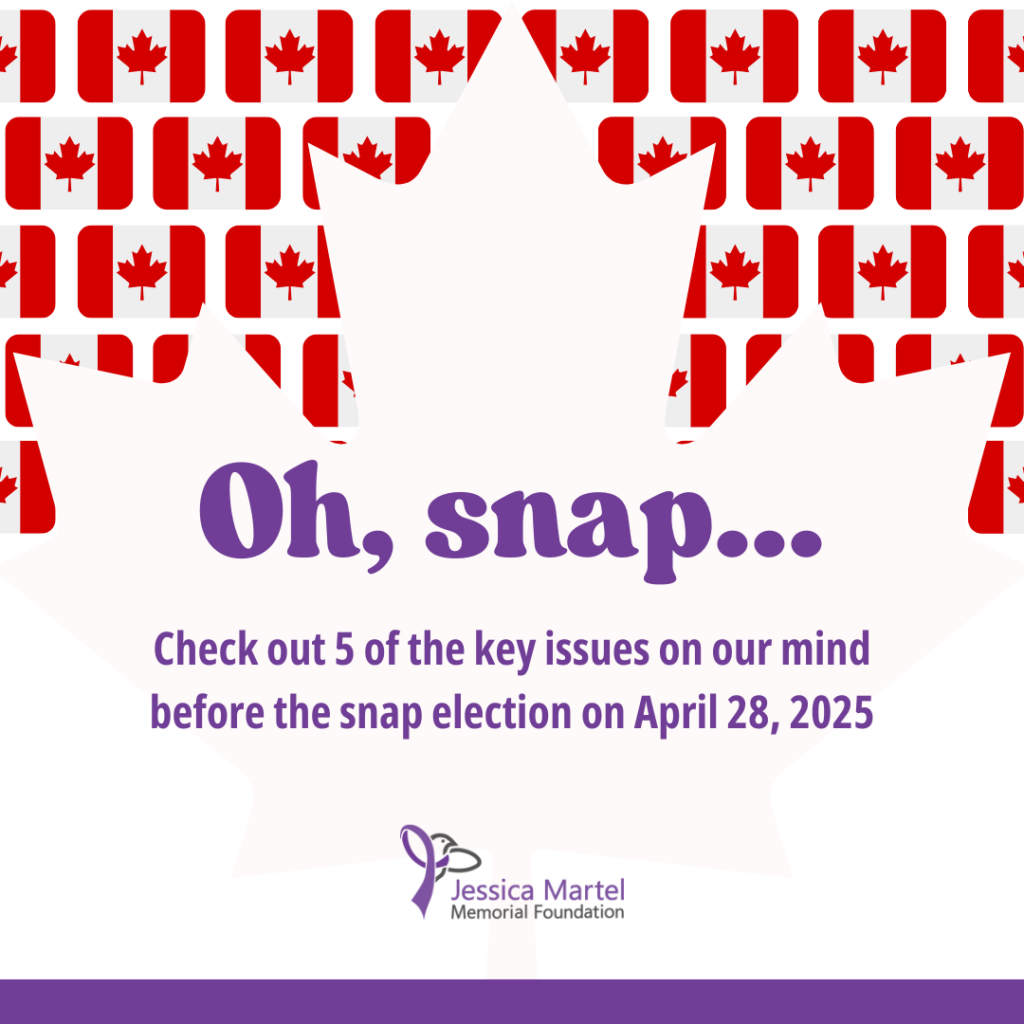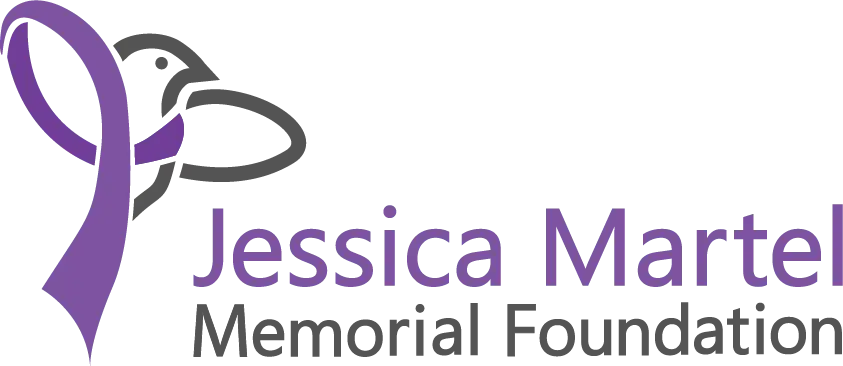On Sunday, March 23, Prime Minister Mark Carney dissolved parliament and set a new election for April 28, 2025.
JMMF’s mission includes advocacy as a key activity to break the cycle of domestic violence. We are firmly bipartisan, but our work is innately political as we advocate for changes to the system that will help us achieve our vision of a future free of domestic violence for all individuals. Election season presents an opportunity to talk about the key issues that impact our work at the federal level. We have put together a brief outline of those issues here.

Key Issues:
Re-establishment of the Minister for Women and Gender Equality (WAGE).
After securing the leadership vote, Prime Minister Mark Carney unveiled a new, leaner cabinet on March 14th. This cabinet excluded the Minster for Women and Gender Equality (WAGE), a key position that had previously signaled a progressive, feminist government.
JMMF is a feminist organization. We know that the root cause of gender-based violence is misogyny. We know that an overwhelming majority of survivors of gender-based violence are women and children. As an all-gender shelter, we also know that misogyny means that men and members of the 2SLGBTQ+ community are also impacted by gender-based violence. As a feminist organization, we firmly believe that gender-equity is crucial to creating a future free of violence.
Re-establishing the Minister for Women and Gender Equality is vital to continuing the work to end gender-based violence. This portfolio was responsible for the National Action Plan to end Gender-Based Violence, including working with Alberta to create Alberta’s Action Plan to end Gender-Based Violence. The momentum of this work is crucial to ending abuse, sexual violence, and femicide.
Bill C-322: An Act to Amend the Criminal Code to include Coercive Control of an Intimate Partner
In 2021, MP Laurel Collins introduced a private member’s bill to amend the Criminal Code to include coercive control of an intimate partner.
“Criminalizing coercive control means giving victims and survivors additional tools to leave abusive situations. We have a responsibility to give these victims more control, more autonomy and more power to escape dangerous situations, hopefully, to prevent the all-too-common escalation to violence,” MP Laurel Collins.
This bill has been through its third reading in the House of Commons with 324 members voting in favour of adopting the bill. It is currently sitting with the Senate and has completed its second reading in December 2024, with a referral to the Standing Senate Committee on Legal and Constitutional Affairs. In order to become a law, the bill must pass a third reading with the Senate and receive Royal Assent from the Governor General before Proclamation.
This bill is crucial to providing another tool to keep survivors safe. During the election, Parliament has been dissolved and all business in the Senate and House of Commons comes to a halt until after the election. While we could be concerned at the prospect that any traction to make this bill a law will permanently cease, the election is also an opportunity to advocate for the importance of Bill C-322.
Legislation for changes to bail, sentencing, and probation to keep violent offenders off the streets and keep survivors safe.
The Canadian government has recently implemented significant changes to the bail system, effective January 4, 2024, aimed at addressing serious repeat violent offenses and enhancing community safety. These reforms target offenders using weapons and those accused of repeat intimate partner violence. Key changes include creating a new reverse onus for serious repeat offenders using weapons, and offenders of intimate partner violence.
We recently posted an update to our own situation with James Urbaniak, convicted murderer of Jessica Martel, was given a full release and then subsequently breached his probation. This full release came after the Parole Board of Canada citing “serious concerns” with Urbaniak hiding an intimate partner relationship while on day parole in 2020.
We believe that sentencing for people who murder their spouse should be much stricter. Often perpetrators accept a plea deal and serve less than 10 years in custody. If they are eventually released on parole, the bar should be higher for reintegration into society so that they will not reoffend.
We will be watching as Bills C-48: An Act to Amend the Criminal Code (bail reform) and C-75: An Act to amend the Criminal Code, the Youth Criminal Justice Act, and other Acts are re-examined throughout the election season. While a lot of the focus has been on bail, before a perpetrator has been convicted of a crime, we feel that probation should also be a focus in keeping violent offenders off the streets and keeping survivors safe.
Affordable Housing
The current housing crisis in Canada has created significant barriers for survivors fleeing abusive situations, often forcing them to choose between staying to their abuser or facing homelessness. Many survivors have experienced financial abuse, leaving them with poor credit scores, forced debt, and lack of income, further complicating their ability to secure housing.
The shortage of affordable housing solutions has led to longer shelter stays, with an average stay at Jessie’s House being 30-60 days. The lack of affordable housing increases the risk of survivors returning to their abuser. The bottleneck effect also reduces the capacity of shelters to assist new survivors in crisis.
Affordable housing is not just about providing shelter; it’s the foundation for safety, dignity, and freedom. It allows a place for survivors to rebuild their lives, pursue employment and education, and break the cycle of violence. We believe that everyone deserves a safe place to stay, and affordable housing is crucial for survivors.
Immigration and Newcomers who experience Abuse
In 2024, Alberta welcomed more than 200,000 new residents, the highest growth rate since 1981.This population growth has also led to a higher number of newcomers who are experiencing domestic violence. At Jessie’s House, have noticed a marked increase in survivors who are newcomers and require extra support. This trend is not unique to JMMF; many of our colleagues at shelters in Alberta have also noticed an increase in newcomers who are survivors of domestic violence.
Newcomers face unique challenges when attempting to leave abusive situations, including language barriers, unfamiliarity with Canadian laws, lack of a natural support network, racism, precarious immigration status, and dependency on abusive partners due to immigration policies. These survivors require extra support, and often stay in shelter for longer periods of time.
In order to meet the needs of this growing demographic, we would like to see increased support for newcomers, including legal support for newcomers who are working through immigration applications and income support for newcomers who are fleeing abusive situations.
Where to seek reliable, balanced information:
Did you know that META has blocked all news agencies from sharing on Facebook and Instagram? A 2022 study showed that 26% of Canadians got their news from social media; now that mainstream news outlets cannot share online, this leaves a vacuum for unbiased, reliable information.
When we see news sources about domestic violence, femicides, and other issues relating to our work, we add them to our website. We will continue to do this throughout the 2025 Federal Election. For more information, visit jessicamartelmemorialfoundation.com/news.
The Canadian Broadcasting Company (CBC) puts together a useful tool called Vote Compass. This tool analyses the policies and positions of the major political parties in one place, and allows you to fill out a survey to see where your own values fit. For more information, visit https://votecompass.cbc.ca/canada

